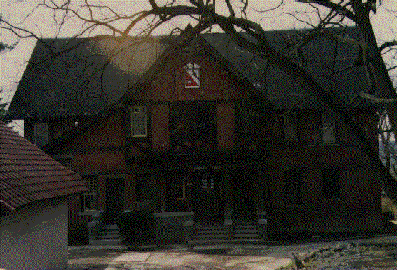

A Brief History
It all started in 1933 when a group of nine amibitious and enterprising young men from Cornell University organized a cooperative organization called Llenroc (spelled C-o-r-n-e-l-l backwards) Lodge Association. The idea itself was not new as cooperative housing was initiated earlier at Yale, but Llenroc was the first cooperative at Cornell University. The students secured a lease from the then owner Dr. Edward Amherst Ott who headed the Association for a brief period. The house was finally signed over to the students in 1938.
Built in the early 1850's, the house initially housed a horse stable and servant's quarters for Ezra Cornell. When converted for use as a cooperative in 1937, the house was divided into north and south dormers where the members slept. Then there were some study rooms where they studied four in a room! In 1940, the name of the house was changed to Cayuga Lodge Student Resident Association, Inc. In 1991 the house underwent another major change when it became coeducational and the dormers were converted into individual rooms. Today there are approximately 23 students living here who are either in single or double rooms.
The Lodge Today
In the early days, candidates for house membership had to go through a lengthy application process and the house members voted on the recommendations of the membership committee. Then they had to pass a 100-question exam on the history and operations of the house before they were finally inducted into the house membership. At that time there used to be an average of 40 members living in the house. Each member was supposed to perform 20 hours plus work on a special project each semester. A dining room served the house members and at one point the dining services were opened to the public. Since then the induction process has been relaxed somewhat and due to the conversion of dormers into individual rooms about 25 students can be accomodated at present. The weekly contribution has been reduced to one of a number of jobs that are rotated through the semester plus 10 hours of work on a special project. The dining services have been replaced by individual cooking or informal cooking groups that anyone can organize.